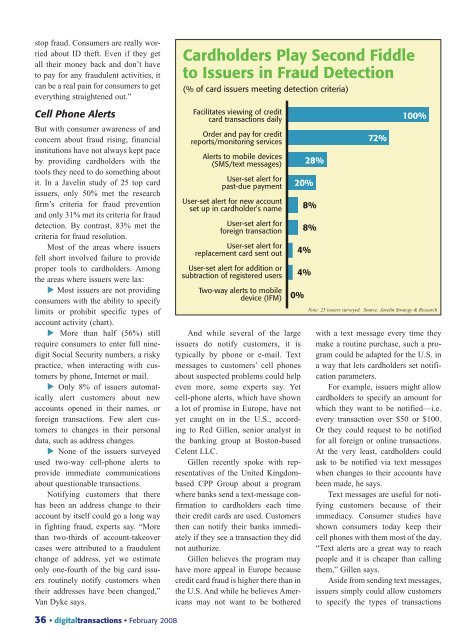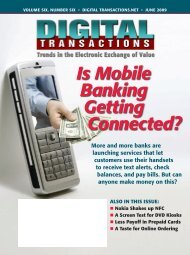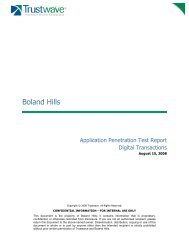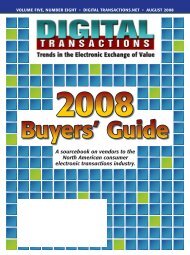The Broken Link - Digital Transactions
The Broken Link - Digital Transactions
The Broken Link - Digital Transactions
Create successful ePaper yourself
Turn your PDF publications into a flip-book with our unique Google optimized e-Paper software.
stop fraud. Consumers are really worried<br />
about ID theft. Even if they get<br />
all their money back and don’t have<br />
to pay for any fraudulent activities, it<br />
can be a real pain for consumers to get<br />
everything straightened out.”<br />
Cell Phone Alerts<br />
But with consumer awareness of and<br />
concern about fraud rising, financial<br />
institutions have not always kept pace<br />
by providing cardholders with the<br />
tools they need to do something about<br />
it. In a Javelin study of 25 top card<br />
issuers, only 50% met the research<br />
firm’s criteria for fraud prevention<br />
and only 31% met its criteria for fraud<br />
detection. By contrast, 83% met the<br />
criteria for fraud resolution.<br />
Most of the areas where issuers<br />
fell short involved failure to provide<br />
proper tools to cardholders. Among<br />
the areas where issuers were lax:<br />
Most issuers are not providing<br />
consumers with the ability to specify<br />
limits or prohibit specific types of<br />
account activity (chart).<br />
More than half (56%) still<br />
require consumers to enter full ninedigit<br />
Social Security numbers, a risky<br />
practice, when interacting with customers<br />
by phone, Internet or mail.<br />
Only 8% of issuers automatically<br />
alert customers about new<br />
accounts opened in their names, or<br />
foreign transactions. Few alert customers<br />
to changes in their personal<br />
data, such as address changes.<br />
None of the issuers surveyed<br />
used two-way cell-phone alerts to<br />
provide immediate communications<br />
about questionable transactions.<br />
Notifying customers that there<br />
has been an address change to their<br />
account by itself could go a long way<br />
in fighting fraud, experts say. “More<br />
than two-thirds of account-takeover<br />
cases were attributed to a fraudulent<br />
change of address, yet we estimate<br />
only one-fourth of the big card issuers<br />
routinely notify customers when<br />
their addresses have been changed,”<br />
Van Dyke says.<br />
Cardholders Play Second Fiddle<br />
to Issuers in Fraud Detection<br />
(% of card issuers meeting detection criteria)<br />
Facilitates viewing of credit<br />
card transactions daily<br />
Order and pay for credit<br />
reports/monitoring services<br />
Alerts to mobile devices<br />
(SMS/text messages)<br />
User-set alert for<br />
past-due payment<br />
User-set alert for new account<br />
set up in cardholder’s name<br />
User-set alert for<br />
foreign transaction<br />
User-set alert for<br />
replacement card sent out<br />
User-set alert for addition or<br />
subtraction of registered users<br />
Two-way alerts to mobile<br />
device (IFM)<br />
And while several of the large<br />
issuers do notify customers, it is<br />
typically by phone or e-mail. Text<br />
messages to customers’ cell phones<br />
about suspected problems could help<br />
even more, some experts say. Yet<br />
cell-phone alerts, which have shown<br />
a lot of promise in Europe, have not<br />
yet caught on in the U.S., according<br />
to Red Gillen, senior analyst in<br />
the banking group at Boston-based<br />
Celent LLC.<br />
Gillen recently spoke with representatives<br />
of the United Kingdombased<br />
CPP Group about a program<br />
where banks send a text-message confirmation<br />
to cardholders each time<br />
their credit cards are used. Customers<br />
then can notify their banks immediately<br />
if they see a transaction they did<br />
not authorize.<br />
Gillen believes the program may<br />
have more appeal in Europe because<br />
credit card fraud is higher there than in<br />
the U.S. And while he believes Americans<br />
may not want to be bothered<br />
20%<br />
0%<br />
28%<br />
8%<br />
8%<br />
4%<br />
4%<br />
72%<br />
100%<br />
Note: 25 issuers surveyed. Source: Javelin Strategy & Research<br />
with a text message every time they<br />
make a routine purchase, such a program<br />
could be adapted for the U.S. in<br />
a way that lets cardholders set notification<br />
parameters.<br />
For example, issuers might allow<br />
cardholders to specify an amount for<br />
which they want to be notified—i.e.<br />
every transaction over $50 or $100.<br />
Or they could request to be notified<br />
for all foreign or online transactions.<br />
At the very least, cardholders could<br />
ask to be notified via text messages<br />
when changes to their accounts have<br />
been made, he says.<br />
Text messages are useful for notifying<br />
customers because of their<br />
immediacy. Consumer studies have<br />
shown consumers today keep their<br />
cell phones with them most of the day.<br />
“Text alerts are a great way to reach<br />
people and it is cheaper than calling<br />
them,” Gillen says.<br />
Aside from sending text messages,<br />
issuers simply could allow customers<br />
to specify the types of transactions<br />
36 • digitaltransactions • February 2008







